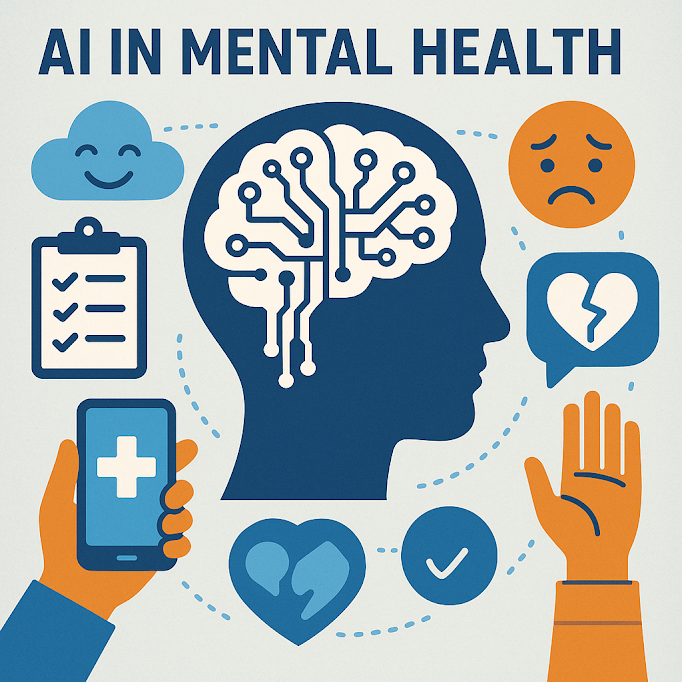By Stuart Kerr, Technology Correspondent
🗓️ Published: 10 July 2025 | 🔄 Last updated: 10 July 2025
📩 Contact: [email protected] | 🔣 Follow @LiveAIWire
🔗 Author Bio: https://www.liveaiwire.com/p/to-liveaiwire-where-artificial.html
The Digital Therapist Will See You Now
Across clinics, apps, and helplines, mental health support is evolving—and AI is in the therapist's chair. From chatbots offering CBT scripts to predictive models scanning language for signs of depression, algorithms are being deployed in sensitive, deeply human spaces. But can a machine truly understand what it means to suffer, to feel joy, or to connect?
Empathy, the ability to understand and share the feelings of another, is at the core of mental health care. And it remains the one thing no model—no matter how complex—can authentically replicate. Despite this, AI systems are being developed and marketed with claims of emotional intelligence. The question is not only whether they can imitate empathy, but whether that imitation is good enough for the people depending on it.
Emulating Empathy: The Technical Challenge
Large language models like OpenAI’s GPT or Google’s Med-PaLM can generate convincingly supportive dialogue. They use probability to craft responses that sound human. But as the UK Government’s National AI Strategy highlights, sounding human and being human are fundamentally different tasks. The former relies on data; the latter relies on consciousness.
In a recent study cited by the UN Governing AI for Humanity report, researchers found that while AI could identify suicidal language cues with up to 88% accuracy, participants reported feeling emotionally disconnected from the interaction. They missed warmth, context, and the nuanced feedback loop that defines real therapeutic relationships.
This gap between emotional mimicry and genuine understanding underscores a core truth: AI can simulate listening, but not care.
From Screening to Intervention: Where AI Is Helping
That doesn't mean AI has no role in mental health care. Far from it. When properly regulated and ethically deployed, AI can:
-
Flag early warning signs by scanning messages, social media posts, or health data.
-
Reduce triage wait times in overburdened healthcare systems like the NHS.
-
Provide 24/7 access to basic emotional support in under-resourced areas.
As outlined in the UK white paper A Pro-Innovation Approach to AI Regulation (PDF), these benefits must be balanced against serious concerns around consent, transparency, and accountability.
Yet even among AI’s defenders, few believe it should replace human therapists. Instead, the focus is shifting toward augmentation. In this model, AI supports human clinicians by identifying patterns, offering prompts, and tracking mood trends over time. The clinician, crucially, still delivers care.
Ethics on the Couch: What Are We Trading?
But with efficiency comes risk. As detailed in our previous article The Algorithm Will See You Now, the automation of care can lead to blind spots. Data-driven models are only as unbiased as the datasets they learn from. And when those datasets reflect racial, gender, or socioeconomic biases, the AI reflects them too.
Moreover, questions around data ownership and patient privacy loom large. As explored in the UN’s Governing AI for Humanity report, mental health data is among the most sensitive information a person can share. Once digitised, it is also among the most vulnerable.
In the US, several mental health apps have already come under investigation for selling user data. The implications go far beyond targeted ads: for vulnerable individuals, the cost of sharing a feeling could be surveillance, profiling, or worse.
Human Touch in a Machine World
Still, the need for expanded mental health support is real. Millions face long waitlists, high costs, or social stigma when seeking help. As we discussed in Faith, Fraud, and Face Filters, the digital world already shapes how we present and perceive ourselves. AI is simply the next iteration.
The key lies in knowing the limits. A chatbot can comfort, but it cannot counsel. A mood tracker can notice patterns, but it cannot understand pain. AI may one day understand context better—but understanding another person? That will remain a human strength.
Conclusion: Support, Not Substitution
Empathy is not code. It is shared humanity. As AI becomes embedded in healthcare infrastructure, we must remember that efficiency is not the same as compassion. The best future is one where AI enables more human care—not less.
Mental health is not a problem to be solved. It is a reality to be lived through, often together. And while machines may help us spot the signs, only people can truly understand the story.
Internal Links Used:
The Algorithm Will See You Now
Faith, Fraud, and Face Filters
External Links Used:
UK National AI Strategy (gov.uk)
UN Governing AI for Humanity (PDF)
A Pro-Innovation Approach to AI Regulation (PDF)
UN Digital Library – Governing AI Report
About the Author
Stuart Kerr is the Technology Correspondent at LiveAIWire. He writes about AI’s impact on health, ethics, infrastructure, and society.
📩 Contact: [email protected] | 🔣 @LiveAIWire

